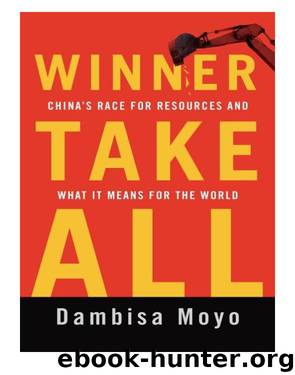Winner Take All by Dambisa Moyo

Author:Dambisa Moyo
Language: eng
Format: epub, mobi
Publisher: Basic Books
Published: 2012-04-30T04:00:00+00:00
Déjà Vu All Over Again
In the spring of 2011 the commodity markets (and the equity market, for that matter) were enraptured by the initial public offering of the commodity trading company Glencore—thought to be an abbreviation for Global Energy Commodities Resources.
Until this time, Glencore’s diversified commodity portfolio spanning soft and hard resources—agricultural products, crude oil and natural gas, coal, zinc, and so on—had been a fiercely guarded secret. Once the portfolio was opened to inspection as part of the company’s public-share offering, Glencore revealed that it controlled 60 percent of the third-party zinc market (these are the transactions involving a trader or intermediary/merchant), 50 percent of copper, 45 percent of lead, 38 percent of alumina, and almost one-third of thermal coal.
Little wonder that when Glencore finally went public in May 2011, its offering was the largest ever on the premium-listing segment of the London Stock Exchange. Today, Glencore is a publicly traded company, maintaining a primary listing on the London Stock Exchange and a secondary listing on the Hong Kong stock exchange.
The breadth and extent of Glencore’s ownership is an impressive display of control and muscle in the commodity markets for a company that, in its entirety, was estimated to be valued at around US$60 billion. Imagine China undertaking a similar strategy, with its vast financial reserves! Such a scenario breathes life into the possibility of the nation and its companies controlling large segments—if not all—of the world’s commodity markets.
Of course, there are numerous obstacles to China’s commodity market dominance coming to pass. Other countries (such as South Korea and Japan as well as the large state-owned wealth funds of Middle Eastern countries like Qatar and United Arab Emirates) and resource corporations (such as Glencore, US oil giant Exxon, or American food corporations Archer Daniels Midland, Monsanto, or Cargill) are jockeying and competing for preeminence in the resource markets too. Of course, there is also the risk of an economic slowdown in China so severe that commodity demand wanes. However, China’s economic fundamentals, capital, and its leadership’s desire to keep the economy progressing rapidly over time place a large discount on this scenario.
With every passing day, China is gaining market share and power, and with market power comes the increasing ability to affect the terms and conditions of exchange, so that the price of a resource will be set by the sole buyer—for all intents and purposes, China. In such a monopsonistic world, the price is no longer imposed by the market as in perfect competition; it’s set by the sole buyer, and the only constraint the monopsonist faces is the limit of the market to supply. A number of factors make the likelihood of China securing significant monopsonist power in the commodities market a real possibility.
Download
This site does not store any files on its server. We only index and link to content provided by other sites. Please contact the content providers to delete copyright contents if any and email us, we'll remove relevant links or contents immediately.
The Meaning of the Library by unknow(2567)
Six Billion Shoppers by Porter Erisman(2296)
Why Nations Fail: The Origins of Power, Prosperity, and Poverty by Daron Acemoglu & James Robinson(2289)
No Time to Say Goodbye(2115)
Red Notice by Bill Browder(2070)
The Economist [T6, 22 Thg9 2017] by The Economist(1926)
Currency Trading For Dummies by Brian Dolan(1925)
Thank You for Being Late by Thomas L. Friedman(1767)
Bitcoin: The Ultimate Guide to the World of Bitcoin, Bitcoin Mining, Bitcoin Investing, Blockchain Technology, Cryptocurrency (2nd Edition) by Ikuya Takashima(1697)
Amazon FBA: Amazon FBA Blackbook: Everything You Need To Know to Start Your Amazon Business Empire (Amazon Empire, FBA Mastery) by John Fisher(1573)
Coffee: From Bean to Barista by Robert W. Thurston(1542)
The Future Is Asian by Parag Khanna(1480)
The Great Economists by Linda Yueh(1454)
How Money Got Free: Bitcoin and the Fight for the Future of Finance by Brian Patrick Eha(1425)
Grave New World by Stephen D. King(1418)
Pocket World in Figures 2018 by The Economist(1416)
Capitalism Without Capital: The Rise of the Intangible Economy by Jonathan Haskel(1398)
The Sex Business by Economist(1382)
Cultural Intelligence by David C. Thomas(1287)
